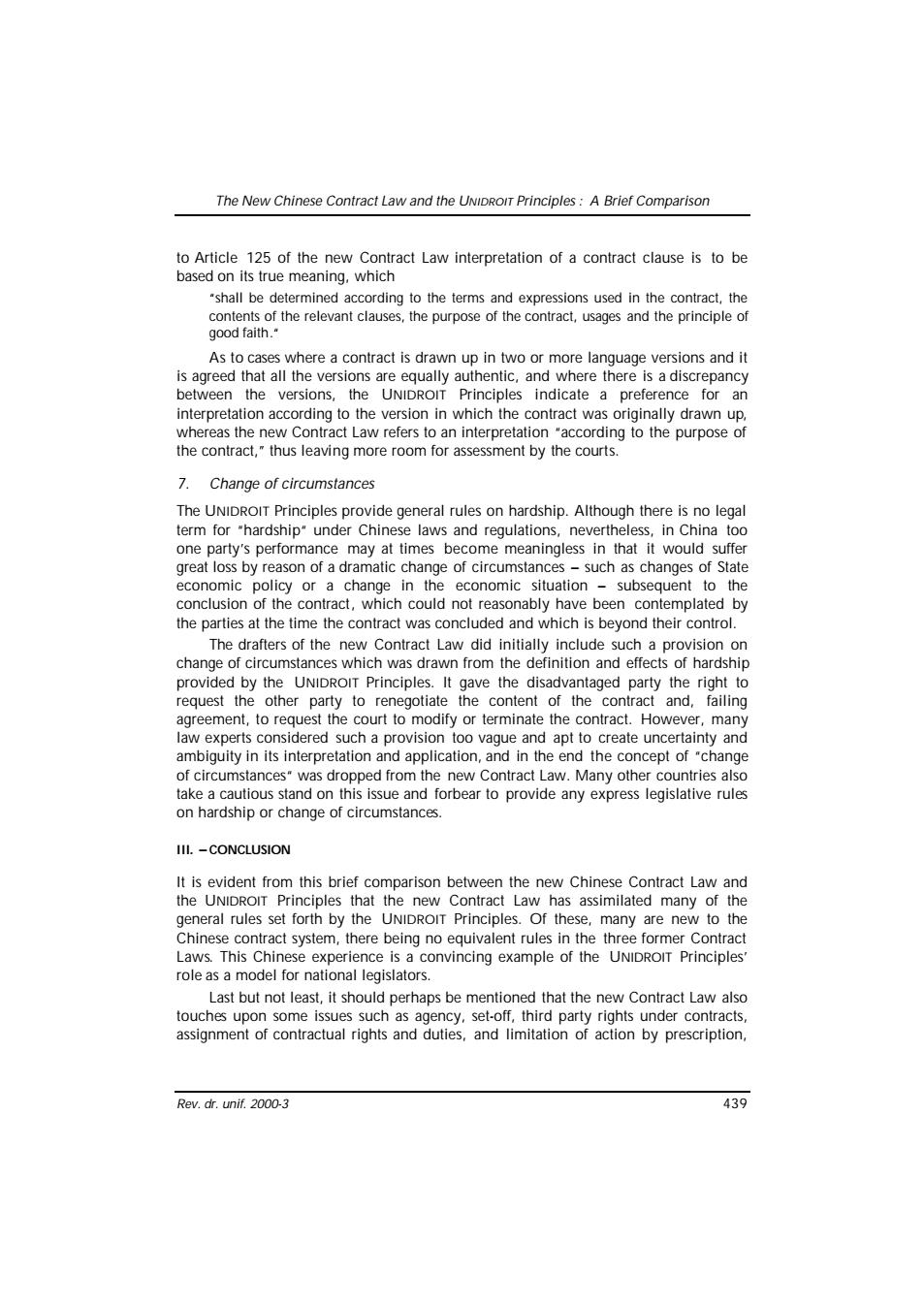正在加载图片...

The New Chinese Contract Law and the UNIDROIT Principles:A Brief Comparison to Article 125 of the new Contract Law interpretation of a contract clause is to be based on its true meaning,which "shall be determined according to the terms and expressions used in the contract,the contents of the relevant clauses,the purpose of the contract,usages and the principle of good faith." As to cases where a contract is drawn up in two or more language versions and it is agreed that all the versions are equally authentic,and where there is a discrepancy between the versions,the UNIDROIT Principles indicate a preference for an interpretation according to the version in which the contract was originally drawn up, whereas the new Contract Law refers to an interpretation "according to the purpose of the contract,thus leaving more room for assessment by the courts. 7.Change of circumstances The UNIDROIT Principles provide general rules on hardship.Although there is no legal term for "hardship"under Chinese laws and regulations,nevertheless,in China too one party's performance may at times become meaningless in that it would suffer great loss by reason of a dramatic change of circumstances-such as changes of State economic policy or a change in the economic situation -subsequent to the conclusion of the contract,which could not reasonably have been contemplated by the parties at the time the contract was concluded and which is beyond their control. The drafters of the new Contract Law did initially include such a provision on change of circumstances which was drawn from the definition and effects of hardship provided by the UNIDROIT Principles.It gave the disadvantaged party the right to request the other party to renegotiate the content of the contract and,failing agreement,to request the court to modify or terminate the contract.However,many law experts considered such a provision too vague and apt to create uncertainty and ambiguity in its interpretation and application,and in the end the concept of"change of circumstances"was dropped from the new Contract Law.Many other countries also take a cautious stand on this issue and forbear to provide any express legislative rules on hardship or change of circumstances III.-CONCLUSION It is evident from this brief comparison between the new Chinese Contract Law and the UNIDROIT Principles that the new Contract Law has assimilated many of the general rules set forth by the UNIDROIT Principles.Of these,many are new to the Chinese contract system,there being no equivalent rules in the three former Contract Laws.This Chinese experience is a convincing example of the UNIDROIT Principles' role as a model for national legislators. Last but not least,it should perhaps be mentioned that the new Contract Law also touches upon some issues such as agency,set-off,third party rights under contracts, assignment of contractual rights and duties,and limitation of action by prescription, Rev.dr.unif.2000-3 439The New Chinese Contract Law and the UNIDROIT Principles : A Brief Comparison Rev. dr. unif. 2000-3 439 to Article 125 of the new Contract Law interpretation of a contract clause is to be based on its true meaning, which “shall be determined according to the terms and expressions used in the contract, the contents of the relevant clauses, the purpose of the contract, usages and the principle of good faith.“ As to cases where a contract is drawn up in two or more language versions and it is agreed that all the versions are equally authentic, and where there is a discrepancy between the versions, the UNIDROIT Principles indicate a preference for an interpretation according to the version in which the contract was originally drawn up, whereas the new Contract Law refers to an interpretation “according to the purpose of the contract,” thus leaving more room for assessment by the courts. 7. Change of circumstances The UNIDROIT Principles provide general rules on hardship. Although there is no legal term for “hardship“ under Chinese laws and regulations, nevertheless, in China too one party’s performance may at times become meaningless in that it would suffer great loss by reason of a dramatic change of circumstances – such as changes of State economic policy or a change in the economic situation – subsequent to the conclusion of the contract, which could not reasonably have been contemplated by the parties at the time the contract was concluded and which is beyond their control. The drafters of the new Contract Law did initially include such a provision on change of circumstances which was drawn from the definition and effects of hardship provided by the UNIDROIT Principles. It gave the disadvantaged party the right to request the other party to renegotiate the content of the contract and, failing agreement, to request the court to modify or terminate the contract. However, many law experts considered such a provision too vague and apt to create uncertainty and ambiguity in its interpretation and application, and in the end the concept of “change of circumstances“ was dropped from the new Contract Law. Many other countries also take a cautious stand on this issue and forbear to provide any express legislative rules on hardship or change of circumstances. III. –CONCLUSION It is evident from this brief comparison between the new Chinese Contract Law and the UNIDROIT Principles that the new Contract Law has assimilated many of the general rules set forth by the UNIDROIT Principles. Of these, many are new to the Chinese contract system, there being no equivalent rules in the three former Contract Laws. This Chinese experience is a convincing example of the UNIDROIT Principles’ role as a model for national legislators. Last but not least, it should perhaps be mentioned that the new Contract Law also touches upon some issues such as agency, set-off, third party rights under contracts, assignment of contractual rights and duties, and limitation of action by prescription